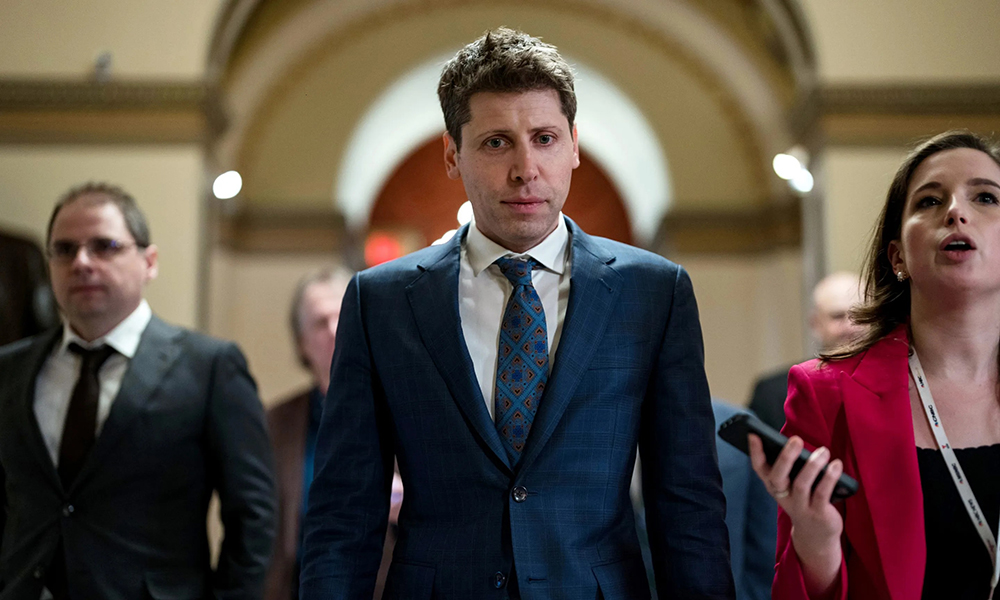
OpenAI首席執(zhí)行官山姆·奧特曼表示,,人工智能可能會比人類更聰明,,并且這一時刻可能比許多人預(yù)期的更早到來,。
奧特曼在其個人網(wǎng)站的一篇博文中討論了他所稱的“智能時代”,,并表示:“我們有可能在幾千天內(nèi)實現(xiàn)超級智能(?。灰苍S這需要更長的時間,,但我確信我們最終會實現(xiàn)這一目標(biāo),。”
當(dāng)然,,“幾千天”是個相當(dāng)寬泛的概念,。2,000天約是5.5年,而5,000天則接近14年,。因此,,雖然奧特曼非常看好人工智能的未來,但他并未預(yù)言這種變化會在短期內(nèi)發(fā)生,。
生成式人工智能的目標(biāo)是匹敵人類的智力,,而超級智能人工智能則可能超越這一目標(biāo),也許會大大超過人類大腦評估問題和做出決策的能力,。鑒于人工智能的潛力,,這項技術(shù)可能會在某種程度上使人們極度恐懼。
奧特曼在博文中提到,,目前,,社會正處于他所說的“智能時代”的開端,他認(rèn)為這可能是人類歷史上最具變革性的時代之一,。
“我相信,,未來將是如此光明,以至于沒有人能通過現(xiàn)在的文字來公正地描述它,;智能時代的一個決定性特征將是大規(guī)模的繁榮,,”他寫道,“雖然這一切將會逐步實現(xiàn),,但驚人的成就——解決氣候問題,、建立太空殖民地以及全面發(fā)現(xiàn)物理學(xué)——最終將變得司空見慣。憑借近乎無限的智慧和充沛的精力——生成偉大想法并將其付諸實踐的能力,,我們可以做很多事情,。”
雖然奧特曼看好人工智能的未來,,但他也指出了潛在的負(fù)面影響,,包括對勞動力市場的沖擊。不過他對此仍持謹(jǐn)慎樂觀的態(tài)度,,認(rèn)為“大多數(shù)工作的變化速度將比大多數(shù)人想象的要慢”,,并表示我們今天所做的許多工作在未來看來都是浪費時間。
“沒有人會回望過去,,希望自己是一名點燈人,,”他寫道。(財富中文網(wǎng))
翻譯:劉進(jìn)龍
審校:汪皓
OpenAI首席執(zhí)行官山姆·奧特曼表示,,人工智能可能會比人類更聰明,,并且這一時刻可能比許多人預(yù)期的更早到來。
奧特曼在其個人網(wǎng)站的一篇博文中討論了他所稱的“智能時代”,,并表示:“我們有可能在幾千天內(nèi)實現(xiàn)超級智能(?。灰苍S這需要更長的時間,,但我確信我們最終會實現(xiàn)這一目標(biāo),?!?/p>
當(dāng)然,“幾千天”是個相當(dāng)寬泛的概念,。2,000天約是5.5年,,而5,000天則接近14年。因此,,雖然奧特曼非??春萌斯ぶ悄艿奈磥恚⑽搭A(yù)言這種變化會在短期內(nèi)發(fā)生,。
生成式人工智能的目標(biāo)是匹敵人類的智力,,而超級智能人工智能則可能超越這一目標(biāo),也許會大大超過人類大腦評估問題和做出決策的能力,。鑒于人工智能的潛力,,這項技術(shù)可能會在某種程度上使人們極度恐懼。
奧特曼在博文中提到,,目前,,社會正處于他所說的“智能時代”的開端,他認(rèn)為這可能是人類歷史上最具變革性的時代之一,。
“我相信,未來將是如此光明,,以至于沒有人能通過現(xiàn)在的文字來公正地描述它,;智能時代的一個決定性特征將是大規(guī)模的繁榮,”他寫道,,“雖然這一切將會逐步實現(xiàn),,但驚人的成就——解決氣候問題、建立太空殖民地以及全面發(fā)現(xiàn)物理學(xué)——最終將變得司空見慣,。憑借近乎無限的智慧和充沛的精力——生成偉大想法并將其付諸實踐的能力,,我們可以做很多事情?!?/p>
雖然奧特曼看好人工智能的未來,,但他也指出了潛在的負(fù)面影響,包括對勞動力市場的沖擊,。不過他對此仍持謹(jǐn)慎樂觀的態(tài)度,,認(rèn)為“大多數(shù)工作的變化速度將比大多數(shù)人想象的要慢”,并表示我們今天所做的許多工作在未來看來都是浪費時間,。
“沒有人會回望過去,,希望自己是一名點燈人,”他寫道,。(財富中文網(wǎng))
翻譯:劉進(jìn)龍
審校:汪皓
OpenAI CEO Sam Altman says artificial intelligence could become smarter than humans sooner than many people expect.
In a blog post on his personal site, Altman discussed what he’s calling the Intelligence Age and said “It is possible that we will have superintelligence in a few thousand days (!); it may take longer, but I’m confident we’ll get there.”
Of course, “thousands” of days is pretty open-ended. 2,000 days is 5.5 years, while 5,000 days is just shy of 14, so while Altman is incredibly bullish on AI’s future, he’s not predicting overnight changes.
Whereas generative AI’s goal is to match the intellectual capabilities of humans, superintelligent AI looks to go even further, perhaps vastly outpacing the human brain’s ability to assess problems and arrive at decisions. It’s a technology that can stoke some of the biggest fears about AI given its potential.
Altman, in his post, said society currently stands at the start of what he calls “The Intelligence Age,” which he believes can be among the most transformative in human history.
“I believe the future is going to be so bright that no one can do it justice by trying to write about it now; a defining characteristic of the Intelligence Age will be massive prosperity,” he wrote. “Although it will happen incrementally, astounding triumphs – fixing the climate, establishing a space colony, and the discovery of all of physics – will eventually become commonplace. With nearly-limitless intelligence and abundant energy – the ability to generate great ideas, and the ability to make them happen – we can do quite a lot.”
While he was bullish on the future of AI, Altman did note the risk of downsides, including the impact on the labor market, but hedged that, saying, “most jobs will change more slowly than most people think” and that many of the jobs we do today will look like wastes of time in the future.
“Nobody is looking back at the past, wishing they were a lamplighter,” he wrote.






